The Devil's Star Read online
Page 22
She noticed for the first time that his accent was different. The sing-song wasn’t there. He put the paper down and looked her in the eye.
Thank God, she didn’t have to lie to him and she knew that she could never have done. She had the proof now. She shook her head, but noticed that she couldn’t control the expression on her face.
He raised an eyebrow.
She swallowed.
The second hand on the clock, the large kitchen clock she had bought at IKEA with his money, ticked soundlessly.
He smiled.
‘And you found piles of letters from my lovers, didn’t you?’
She blinked, totally at sea.
He leaned forward. ‘I’m kidding, Eva. Is anything wrong?’
She nodded.
‘I’m pregnant,’ she whispered quickly, as if there were some sudden rush. ‘I . . . we . . . are going to have a baby.’
He sat there, stunned, staring in front of him as she talked about her suspicions, the visit to the doctor and then, finally, the certainty. When she had finished, he got up and left the kitchen. He came back and gave her a little black box.
‘Visit my mother,’ he said.
‘What?’
‘You were wondering what I was going to do in Oslo. I’m going to visit my mother.’
‘Have you got a mother . . .’
That was her first thought. Had he really got a mother? But she added: ‘. . . in Oslo?’
He smiled and nodded towards the box.
‘Aren’t you going to open it, Liebling. It’s for you. For the child.’
She blinked twice before she could collect herself sufficiently to open it.
‘It’s beautiful,’ she said and felt her eyes welling up with tears.
‘I love you, Eva Marvanova.’
The sing-song was back in his accent.
She smiled through her tears as he held her in his arms.
‘Forgive me,’ she whispered. ‘Forgive me. That you love me is all I need to know. The rest is unimportant. You don’t need to tell me about your mother. Or the gun . . .’
She felt his body harden in her arms. She put her mouth to his ear.
‘I saw the gun,’ she whispered. ‘But I don’t need to know anything. Nothing, do you hear?’
He freed himself from her clasp.
‘Yes, well,’ he said. ‘I’m sorry, Eva, but there’s no way out. Not now.’
‘What do you mean?’
‘You’ll have to know who I am.’
‘But I know who you are, darling.’
‘You don’t know what I do.’
‘I don’t know that I want to know.’
‘You have to.’
He took the box from her, took out the necklace inside it and held it up.
‘This is what I do.’
The star-shaped diamond shone like a lover’s eye as it reflected the morning light from the kitchen window.
‘And this.’
He pulled his hand out of his jacket pocket. In his hand was the same gun she had seen in the suitcase. But it was longer and had a large black piece of metal attached to the end of the barrel. Eva Marvanova did not know much about weapons, but she knew what this was. A silencer, an appropriate name.
Harry was woken up by the telephone ringing. He felt as if someone had stuffed a towel in his mouth. He tried to moisten it with his tongue, but it rasped like a piece of stale bread against his palate. The clock on his bedside table showed 10.17. Half a memory, half an image entered his brain. He went into the sitting room. The telephone rang for the sixth time.
He picked up the receiver:
‘Harry. Who is it?’
‘I just wanted to apologise.’
It was the voice he always hoped to hear.
‘Rakel?’
‘It’s your job,’ she said. ‘I have no right to be angry. I’m sorry.’
Harry sat in the chair. Something was trying to struggle out of the undergrowth of his half-forgotten dreams.
‘You have every right to be angry,’ he said.
‘You’re a policeman. Someone has to watch over us.’
‘I’m not talking about the job,’ Harry said.
She didn’t answer. He waited.
‘I long for you,’ she said in a tear-filled voice.
‘You long for the person you wish I could be,’ he said. ‘Whereas I long for –’
‘Bye,’ she said, like a song cutting out in the middle of the intro.
Harry sat staring at the telephone, elated and dejected at the same time. A fragment of the night’s dream made a last attempt to come to the surface, bumping against the underside of ice which grew thicker by the second as the temperature sank. He ransacked the coffee table for cigarettes and found a dog-end in the ashtray. His tongue was still semi-numb. Rakel had probably concluded from his slurred diction that he was out of it again, which was not so far from the truth, except that he was in no mood to have more of the same poison.
He went into the bedroom and glanced at the clock on the bedside table. Time to go to work. Something . . .
He closed his eyes.
An echo of Duke Ellington hung in his auditory canals. It wasn’t there; he would have to go in further. He kept listening. He heard the pained scream of the tram, a cat’s footsteps on the roof, and an ominous rustling in the bursting green birch foliage in the yard. Even further in. He heard the yard groan, the cracking of the putty in the window frames, the rumble of the empty basement room way down in the abyss. He heard the piercing scraping sound of the sheets against his skin and the clatter of his impatient shoes in the hall. He heard his mother whispering as she used to do before he went to sleep: ‘Bak skapet bakenfor skapet bakenfor skapet til hans madam . . .’ And then he was back in the dream.
The dream from the night. He was blind; he must be blind because he could only hear.
He heard a low chanting voice together with a kind of mumbling of prayers in the background. Judging by the acoustics he was in a large, churchlike room, but then there was the continuous drip. From under the high vaulted ceiling, if that was what it was, resounded wildly flapping wings. Pigeons? A priest or a preacher may have been leading a gathering, but the service was strange and alien. Almost like Russian, or speaking in tongues. The congregation joined in a psalm. Odd harmony with short, jagged lines. No familiar words like Jesus or Maria. Suddenly the congregation began to sing and an orchestra began to play. He recognised the melody. From television. Wait a minute. He heard something rolling. A ball. It stopped.
‘Five,’ said a woman’s voice. ‘The number is five.’
The code.
23
Friday. A Human Number
Harry’s revelations used to be small, ice-cold drips that hit him on the head. Not any more, but, of course, by looking up and following the fall of the drips he could establish the causal connection. This revelation was different. This was a gift, theft, an undeserved favour from an angel, music that could come to people like Duke Ellington, ready-made, straight out of a dream. All you had to do was to sit down and play it.
And Harry was in the process of doing just that. He had summoned the concert audience to his own office at 1.00. That was enough time for him to fit the most essential part, the last part of the code. For that he needed the Pole Star. And a star chart.
On his way to work he slipped into a stationer’s to buy a ruler, a protractor, a pair of compasses, a felt tip with the finest point they had and a couple of overhead transparencies. He set to work as soon as he got to his office. He found the large Oslo map he had torn down, mended a rip, smoothed the surface of the noticeboards and pinned the map up again on the long wall in his office. Then he drew a circle on the transparency, divided it up into five sectors of exactly 72 degrees each and then, using the felt pen and the ruler, joined up each of the two points furthest away from each other in one continuous line. When he had finished he lifted the transparency up to the light. The devil’s star.
&n
bsp; The overhead projector in the conference room had gone missing, so Harry went into the Crime Division’s conference room where Chief Inspector Ivarsson held his regular lecture – known as ‘How I became so clever’ among colleagues – to a group of press-ganged holiday stand-ins.
‘High priority,’ Harry said, pulling out the plug and rolling out the projector trolley past an astonished Ivarsson.
Back in his office, Harry put the transparency on the projector, pointed the square of light towards the map and switched off the main light.
In the darkened, windowless room he could hear his own breathing as he twisted the transparency round, moved the projector closer and further away and adjusted the focus of the black outline of a star until it matched. It did match. Of course it matched. He stared at the map, circled two street numbers and made a couple of telephone calls.
Then he was ready.
At 1.05 Bjarne Møller, Tom Waaler, Beate Lønn and Ståle Aune were sitting on borrowed chairs, crushed into Harry and Halvorsen’s shared office, as quiet as mice.
‘It’s a code,’ Harry said. ‘A very simple code. A common denominator we should have seen ages ago. We were given it very clearly. A numerical figure.’
They looked at him.
‘Five,’ Harry said.
‘Five?’
‘The number is five.’
Harry watched the four puzzled faces.
Then something happened which he had experienced now and then, more frequently as time went on, after long periods of drinking. Without any prior warning, the ground suddenly gave way. He had a falling sensation and he lost all sense of reality. There weren’t four colleagues sitting in front of him in an office, it wasn’t a murder case, it wasn’t a warm summer’s day in Oslo, no-one called Rakel and Oleg ever existed. He knew that this brief panic attack could be followed by others and he hung on by his fingertips.
Harry lifted his mug of coffee and drank slowly while he collected himself.
He determined that when he heard the sound of the mug being put down on the desk he would be back, here, in this reality.
He put the mug down.
It landed with a soft thud.
‘First question,’ Harry said. ‘The killer has left his mark on all the victims with a diamond. How many sides does it have?’
‘Five,’ Møller said.
‘Second question. He also cut off one finger on the left hand of every victim. How many fingers are there on a hand? Third question. The killings and the disappearance took place over three consecutive weeks on Friday, Wednesday and Monday respectively. How many days are there between each of them?’
It was quiet for a moment.
‘Five,’ said Waaler.
‘And the time?’
Aune cleared his throat: ‘Around five o’clock.’
‘Fifth and last question. The addresses of the victims appear to have been chosen at random, but the crime scenes have got one thing in common. Beate?’
She pulled a face. ‘Five?’
All four of them stared vacantly at Harry.
‘Oh, bloody . . .’ Beate exclaimed, stopping in her tracks and blushing. ‘Sorry, I meant . . . on the fifth floor. All the victims died on the fifth floor.’
‘Exactly.’
Realisation began to dawn on the others’ faces as Harry went to the door.
‘Five.’
Møller spat it out as if it were a revolting word he had just eaten.
It was pitch black when Harry switched off the light. They could only hear his voice as he moved around.
‘Five is a familiar number in a variety of rituals. In black magic. Witchcraft. And in devil worship. Also in Christianity. Five is the number of wounds Christ had on the cross. And there are the five pillars and the five calls to prayer in Islam. In several writings five is referred to as the human number, as we have five senses and go through five stages of life.’
There was a click and all of a sudden a pale illuminated face with black sunken eye sockets and a star on the forehead materialised in front of them in the darkness. A low buzz of whispers ensued.
‘Sorry . . .’
Harry twisted the projector round so that the square of light shifted from his face and onto the white wall.
‘This is, as you can see, a pentagram or devil’s star, the same as we found carved and drawn near the bodies of Camilla Loen and Barbara Svendsen. Based on the golden section, as it’s known. How’s that worked out again, Ståle?’
‘I really haven’t a clue,’ the psychologist sniffed. ‘I loathe exact sciences.’
‘OK,’ Harry said. ‘I made a simple version with a protractor. It’s good enough for our purposes.’
‘Our purposes?’ Møller asked.
‘So far I’ve shown you some numerical coincidences that could well have been chance. This is the proof that they aren’t.’
‘The three killings took place on the edge of a circle with its centre in the heart of Oslo,’ Harry said. ‘In addition, they are separated by an interval of exactly seventy-two degrees. As you can see here, the crime scenes are located . . .’
‘. . . on the tips of three points of the star,’ Beate whispered.
‘My God,’ Møller said in amazement. ‘Do you mean that he . . . that he hasgivenus . . .’
‘He’s given us a Pole Star,’ Harry said. ‘It’s his code . . . to tell us about the five murders. Three have already been carried out and there are still two to come. Which, according to the star, should occur here and here.’
Harry pointed to the rings he had drawn on the map around two of the points.
‘And we know when,’ Tom Waaler said.
Harry nodded.
‘My God,’ Møller said. ‘With five days between each murder, that’ll be . . .’
‘Saturday,’ Beate said,
‘Tomorrow,’ Aune said.
‘My God,’ Møller said for the third time. The invocation sounded heartfelt.
Harry continued talking, interrupted by the excited voices of the others, as the sun arced high across the pale, scorched summer sky above the small white sails of boats making drowsy, half-hearted attempts to find their way back to land. In Bjørvika at the raised intersection known popularly as the Traffic Machine, a carrier bag floated on the warm air currents above the roads, which wound in and out of one another like entangled vipers in a nest. On the seaward side of a storage shed on the future building site of the opera house, a man was working hard to find a vein under an already inflamed sore; he was scowling around him like an emaciated leopard over its prey, conscious that he would have to hurry before the hyenas appeared.
‘Wait a moment,’ Tom Waaler said. ‘How could the killer know that Lisbeth Barli lived on the fifth floor if he was waiting down on the street?’
‘He wasn’t waiting around on the street,’ Beate said. ‘He was in the stairwell. We checked out what Barli said about the door not closing properly, and it’s true. He kept an eye on the lift to see if anyone was coming down from the fifth floor and hid in the passage down to the basement if anyone turned up.’
‘Good, Beate,’ Harry said. ‘And then?’
‘He followed her out onto the street and . . . no, that’s too risky. He stopped her as she got out of the lift. And used chloroform.’
‘No,’ Waaler said firmly. ‘Too risky. Then he would have had to carry her out to a car parked outside and if anyone had seen them, they would have certainly taken note of the car and perhaps the number.’
‘No chloroform,’ Møller said. ‘And the car was parked some distance away. He threatened her with a gun and made her walk in front of him while he followed with the gun hidden in his pocket.’
‘Whatever happened, the victims are chosen at random,’ Harry said. ‘The key is the place the murder is committed. If Wilhelm Barli had taken the lift down from the fifth floor instead of his wife, he would have been the victim.’
‘If it is as you say, it might also explain why the women were not sexu
ally abused,’ Aune said. ‘If the murderer . . .’
‘The killer.’
‘. . . the killer did not choose the victims, it means that the fact that they are all women is coincidence. In this case, the victims are not specifically sexual objects. It is the action itself which gives him his satisfaction.’
‘What about the Ladies?’ Beate said. ‘That wasn’t random. Wouldn’t it have been more natural for a man to go to the Gents if the sex of the victim is of no consequence? Then he wouldn’t have risked attracting attention on his way in or out.’
‘Maybe,’ Harry said. ‘But if he’d prepared as thoroughly as it appears he did, he would have known that there are a lot more men than women in a solicitor’s office. Do you see?’
Beate blinked hard with both eyes.
‘Good thinking, Harry,’ Waaler said. ‘In the Ladies there was much less chance of him being disturbed during the ritual.’
It was 2.08 and it was Møller who finally brought the proceedings to an end.
‘OK, folks, that’s enough about the dead. Shall we concentrate on the living?’
The sun had started on the second half of its parabola, and the shadows were edging out into a deserted schoolyard in Tøyen where all that could be heard was the monotonous smack of a football being kicked against a wall. In Harry’s hermetically sealed office the air had become a thick broth of evaporated human fluids. The point of the star to the right of Carl Berners plass lay above a property just by Ensjøveien in Kampen. Harry had explained that the building under the tip of the point had been built in 1912 as what was known then as a ‘tuberculosis home’, but had since been converted into a student building. At first, for home economics students, then for student nurses and finally for students in general.
The final tip of the pentagram pointed to a grid of black parallel lines.
‘Railway lines from Oslo Station?’ Møller asked. ‘Nobody lives there, do they?’
‘Careful,’ Harry said, pointing to a small square that had been shaded in.
‘That must be a storage shed. It’s –’
‘No. The map’s right,’ Waaler said. ‘There is in fact a house there. Haven’t you noticed it when you come in by train? That strange detached brick-built house standing completely on its own. There’s a garden and so on . . .’

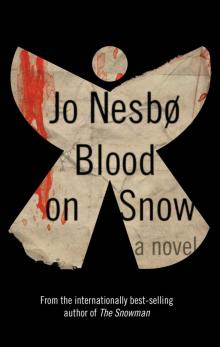 Blood on Snow: A novel
Blood on Snow: A novel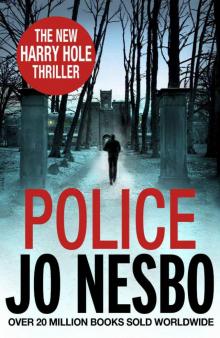 Police: A Harry Hole thriller (Oslo Sequence 8)
Police: A Harry Hole thriller (Oslo Sequence 8) Doctor Proctor's Fart Powder: The Great Gold Robbery
Doctor Proctor's Fart Powder: The Great Gold Robbery Bubble in the Bathtub
Bubble in the Bathtub Doctor Proctor's Fart Powder: Time-Travel Bath Bomb
Doctor Proctor's Fart Powder: Time-Travel Bath Bomb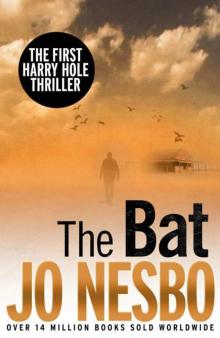 The Bat
The Bat Doctor Proctor's Fart Powder: The End of the World. Maybe.
Doctor Proctor's Fart Powder: The End of the World. Maybe. Silent (but Deadly) Night
Silent (but Deadly) Night Who Cut the Cheese?
Who Cut the Cheese? Headhunters
Headhunters The Jealousy Man and Other Stories
The Jealousy Man and Other Stories Harry Hole Mysteries 3-Book Bundle
Harry Hole Mysteries 3-Book Bundle The Thirst
The Thirst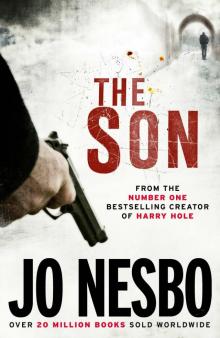 The Son
The Son The Redeemer
The Redeemer The Kingdom
The Kingdom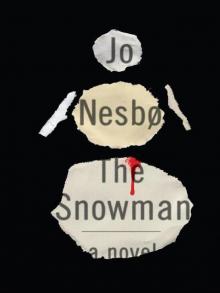 The Snowman
The Snowman The Redbreast
The Redbreast Phantom
Phantom Macbeth
Macbeth The Leopard
The Leopard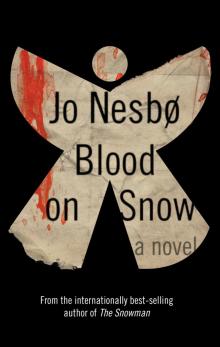 Blood on Snow
Blood on Snow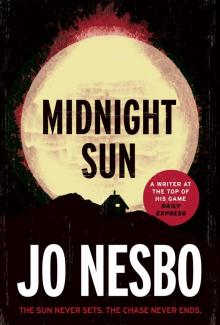 Midnight Sun
Midnight Sun The Redbreast (Harry Hole)
The Redbreast (Harry Hole)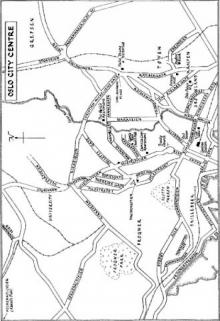 The Devil's Star
The Devil's Star Cockroaches
Cockroaches The Magical Fruit
The Magical Fruit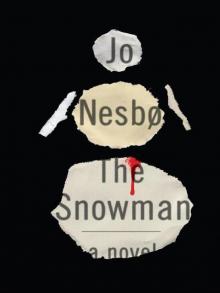 The Snowman: A Harry Hole Novel
The Snowman: A Harry Hole Novel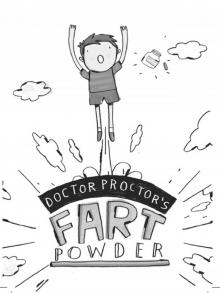 Doctor Proctor's Fart Powder
Doctor Proctor's Fart Powder The Cockroaches
The Cockroaches Knife
Knife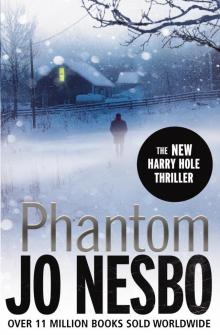 Phantom hh-9
Phantom hh-9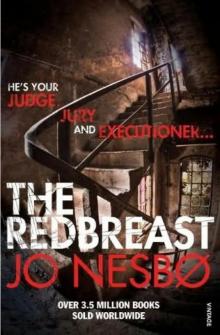 The Redbreast hh-3
The Redbreast hh-3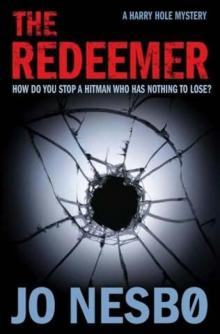 The Redeemer hh-6
The Redeemer hh-6 The Leopard hh-8
The Leopard hh-8 The Leopard: An Inspector Harry Hole Novel
The Leopard: An Inspector Harry Hole Novel The Great Gold Robbery
The Great Gold Robbery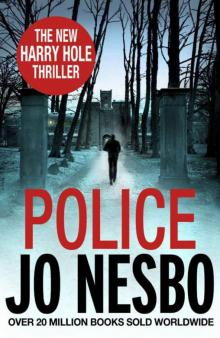 Police hh-10
Police hh-10 The End of the World. Maybe
The End of the World. Maybe The Thirst: Harry Hole 11
The Thirst: Harry Hole 11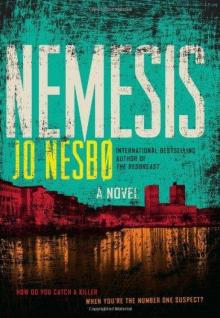 Nemesis - Harry Hole 02
Nemesis - Harry Hole 02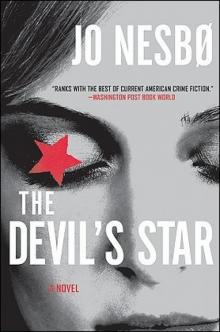 The Devil's star hh-5
The Devil's star hh-5 Time-Travel Bath Bomb
Time-Travel Bath Bomb